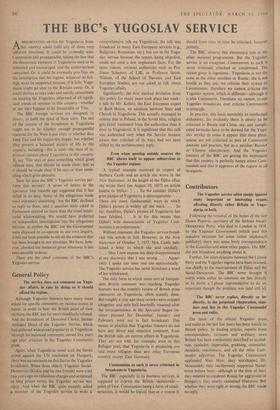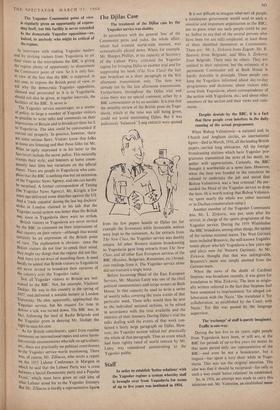Contributors
The Yugoslav service often simply ignorei many important or interesting events, • affecting directly either Britain or Yugo- slavia, or both.
Following the removal of the bones of the fate Dusen Popovic, secretary of the Serbian Social- Democratic Party, who died in London in 1918. by the Yugoslav Government (which used this micabre occasion for some rather unpleasant publicity), there was some lively correspondence in the Guardian and some other papers. The BBC did not broadcast. anything about it.
Further, for years relations between the Labour Party and the Yugoslav regime have been strained, due chiefly to the maltreatment of Djilas and the Social-Democrats. The BBC never thought it worth while either to comment on this rdirectjy or to invite a Labour representative to do so. important though the problem was (arid still IS).
-The BBC never replies, directly or in- directly, to the perpetual vituperation, shin ders and lies in the Yugoslav Communist press and radio.
The tenor of the official Yugoslav press and radio in the last few years has been hostile to British policy. In leading articles, reports from correspondents, cartoons and ordinary news Britain has been consistently described as second- rate, capitalist, imperialist, grabbing, colonialist, decadent, reactionary, and all the other Com- munist adjectives. The Yugoslav Communists applauded Mau Mau; they worshipped Di. Moussadek; they vociferously supported Nasser (even before Suez—although at the time of. Suez they omitted to condemn Russia for aggression in Hungary); they nearly canonised Makarios. But whether they were right or wrong, the BB(' made no reply. The Yugoslav Communist point of view is regularly given an opportunity of expres- sing itself, but this facility is never extended to the democratic Yugoslav opposition—or, indeed, to anybody who might be critical of the regime.
In interviews with visiting Yugoslav leaders and by inviting visitors from Yugoslavia to air their views at the microphone the BBC is giving the regime plenty of opportunity to disseminate the Communist point of view. So it is only fair, in view of the fact that the BBC is supposed, in any case, to express the British point of view, to ask why the democratic Yugoslav opposition, silenced and persecuted as it is in Yugoslavia, should not also be given, at regular intervals, the facilities of the BBC. It never is.
The Yugoslav service encourages, as• a matter of Policy, as large a number of Yugoslav visitors as possible to write talks and comments on their impressions of Britain and to broadcast them ba:k to Yugoslavia. The idea could be commended if carried out properly. In practice, however, there are some serious flaws. Visitors know that folks at home are listening and that those folks (as Mr. Wiles so aptly expressed it in his letter to the Spectator) include the secret police. This naturally Cramps their style; and listeners at home conse- quently hear little but variations on the official theme. There are people in Yugoslavia who com- Plain that the BBC is nothing else but an extension of the Yugoslav News Agency, and one can hardly be surprised. A former correspondent of Tanjug (the Yugoslav News Agency), Mr. Kirigin, a few Years ago delivered some diatribes against the US. And a 'trade unionist' during the last big dockers' strike in London claimed in his talk that the Yugoslav social system was better than the British °Ile, since in Yugoslavia there were no strikes. British visitors to Yugoslavia are never invited by the BBC to comment on their impressions of that country on their return—although that would certainly be an expression of the British point of view. The explanation is obvious: since the British visitors do not fear to speak their mind, they might say things that the regime did not like. And there are-no ways of muzzling them. It need hardly be added that British visitors to Yugoslavia are never invited to broadcast their opinions of the country over the Yugoslav radio.
Not all Yugoslav visitors to Britain are wel- comed to the BBC. Not, for example, Vladimir bedijer. He was in this country in the spring of 1957, and .delivered a notable lecture at London University. He also, apparently, approached the Yugoslav service, .but his request for time to deliver a talk was turned down. The BBC was, in fact, following the lead of Radio Belgrade and the Yugoslav press in denying Mr. Dedijer the right to state his case.
\ As for British contributors, apart from routine comments on international topics and some harm- less outside commentators who talk on agriculture, etc., there are practically no political contributors to the Yugoslav service worth mentioning. There Was, of course, Mr. Zilliacus, who wrote a report on the 1953 Labour Conference in Margate in which he said that the Labour Party was 'a cross between a Social-Democratic party and a Popular Front,' which must have given an odd idea of What Labour stood for to the Yugoslav listeners. But Mr. Zilliacus is hardly a representative figure.











































 Previous page
Previous page